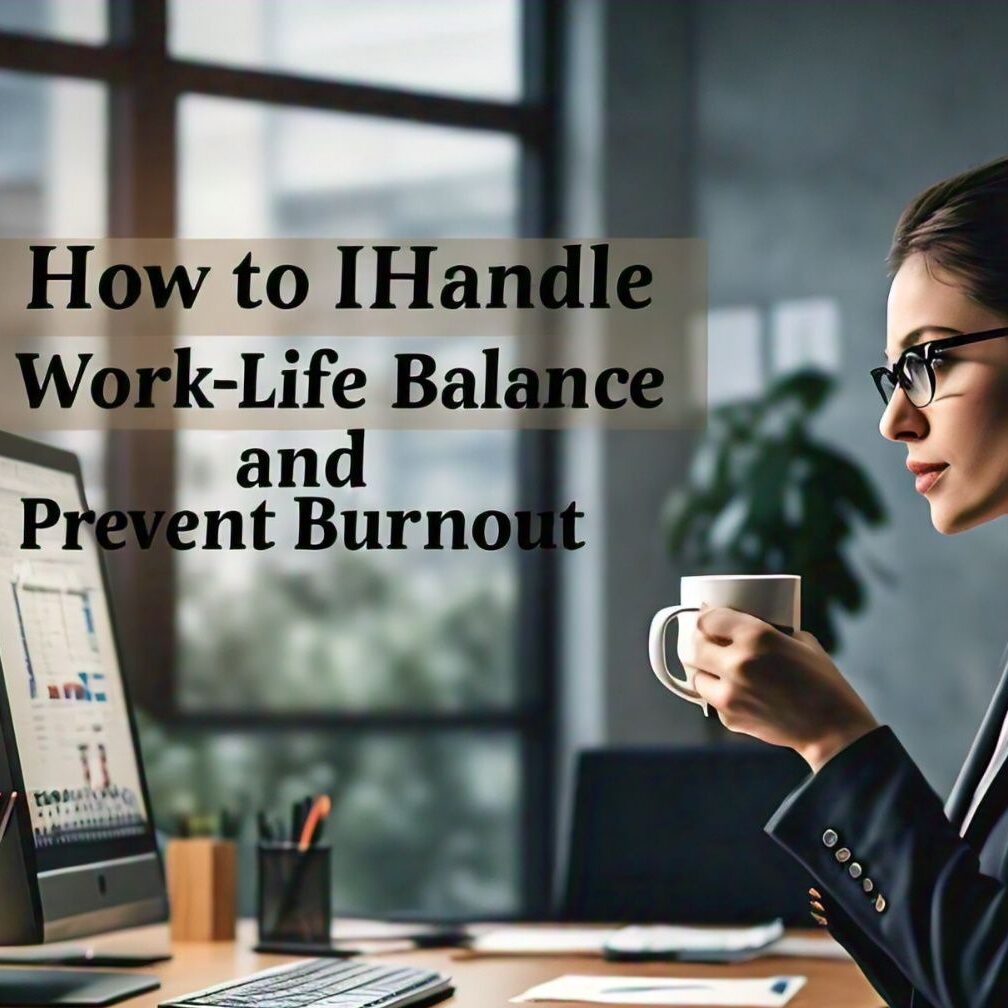10 Tips for Preventing Burnout and Achieving Work-Life Balance:
Preventing Burnout and Achieving Work-Life Balance: In our hectic, constantly linked lives, burnout has become a typical occurrence, and striking a healthy work-life balance is becoming more and more challenging. Physical and mental tiredness can result from the overwork, worry, and emotional depletion that many individuals experience. It takes more than just reducing hours to prevent burnout and manage work-life balance; it also entails setting up enduring routines and boundaries that enable you to succeed on the job and in your personal life. We’ll look at doable tactics in this blog to help you stay balanced, rejuvenate, and avoid burnout.

1. Comprehending Burnout: Definition and Causes
Chronic stress that results in emotional tiredness, alienation, and a lessened sense of accomplishment is known as burnout. It frequently results from ongoing stress at work, particularly when demands and resources are out of balance. Managing burnout requires an understanding of its symptoms, which include irritation, exhaustion, and decreased productivity. Avoiding burnout is crucial for wellbeing and productivity because it can affect your mental, physical, and emotional well-being.
2. The Value of Establishing Boundaries at Work
Establishing boundaries is one of the best strategies to manage work-life balance.This entails establishing clear boundaries for your workday, limiting the amount of time you spend checking emails after work, and bucking the urge to take on more than you can handle. To help your managers and coworkers understand your availability, let them know these restrictions. Setting limits is essential for protecting oneself from burnout, avoiding overwork, and maintaining personal time.
3. Making Self-Care a Priority: The Basis of Equilibrium
The key to managing stress and preventing burnout is self-care. It entails setting aside time to rest, eat well, and partake in rejuvenating activities. Taking short pauses during the day, eating well, getting adequate sleep, and implementing relaxation techniques like yoga or meditation can all be considered forms of self-care. Setting aside time for self-care allows you to rejuvenate both mentally and physically. This is essential to preserving a sound equilibrium.
4. Developing Time Management Skills to Increase Productivity
You may accomplish more in less time with efficient time management, which lowers stress and frees up time for personal pursuits. Divide more complex jobs into smaller, more achievable steps and begin by prioritizing tasks according to their priority and urgency. To maintain organization and focus, employ productivity tools, establish reasonable deadlines, and refrain from multitasking. By reducing needless work-related stress, better time management not only increases productivity but also makes it possible to have a more balanced life.
5. The Ability to Say “No” to Prevent Overcommitment
Saying “yes” to everything might easily result in burnout. It’s critical to understand your boundaries and have the confidence to say “no” when your workload becomes too much.The ability to politely decline extra work or delegate when feasible is crucial for preserving work-life balance. Saying “no” helps you prioritize your tasks, lower your stress levels, and avoid feeling overburdened all the time.
6. Establishing a Stress Management Support Network
A strong defense against stress and burnout is social support. Seek guidance and emotional support from friends, family, and coworkers. Speaking with others about difficulties at work might help you see things more clearly, feel less alone, and find workable solutions. Additionally, think about locating a mentor who can provide advice or joining a professional network. One of the most important tools for preserving equilibrium and developing resilience is a solid support network.
7. Making the Most of Breaks to Recharge and Increase Productivity
To prevent burnout and maintain productivity, it is imperative to take breaks throughout the day. A break might be anything from a quick stroll or stretch to a lengthier lunch break or afternoon nap. You can take regular pauses to disconnect from your work, decompress, and rejuvenate. To maintain a high level of productivity without overworking yourself, think about utilising strategies like the Pomodoro method, which involves working in concentrated bursts interspersed with brief pauses.
8. Choosing Remote Work and Flexibility
Adopt flexible work schedules that let you organise your job around your personal requirements if at all possible.Nowadays, a lot of companies provide flexible scheduling or remote work choices, which can shorten commutes and improve time management for personal obligations. By providing you greater control over your daily schedule, flexible work can greatly reduce the strain of juggling your personal and professional lives and help you avoid burnout.
9. Using Mindfulness to Improve Stress Reduction
You can manage stress, improve focus, and preserve emotional equilibrium by engaging in mindfulness exercises like breathing techniques, meditation, and mindful awareness. Just a few minutes of mindfulness practice daily can boost your general wellbeing and resilience to stress. Staying in the moment, accepting stress without passing judgment, and handling difficulties with composure are all encouraged by mindfulness. A great strategy for maintaining equilibrium and avoiding problems is to incorporate mindfulness into your daily practice.
10. Final Thoughts: Fostering a Long-Term Work-Life Harmony
Making deliberate, healthful decisions is essential to preventing burnout and achieving a sustainable work-life balance. You may design a lifestyle that promotes both career success and personal fulfilment by establishing boundaries, placing a high priority on self-care, using your time wisely, and asking for help when you need it. Keep in mind that finding a pace that suits you and promotes your long-term wellbeing is what balance is all about, not perfection. You can succeed at work and in life by making minor but steady changes to put wellbeing first.
This manual offers practical advice and methods for avoiding burnout and striking a good work-life balance. You may create a rewarding profession without compromising your wellbeing or personal life by adopting these habits.
